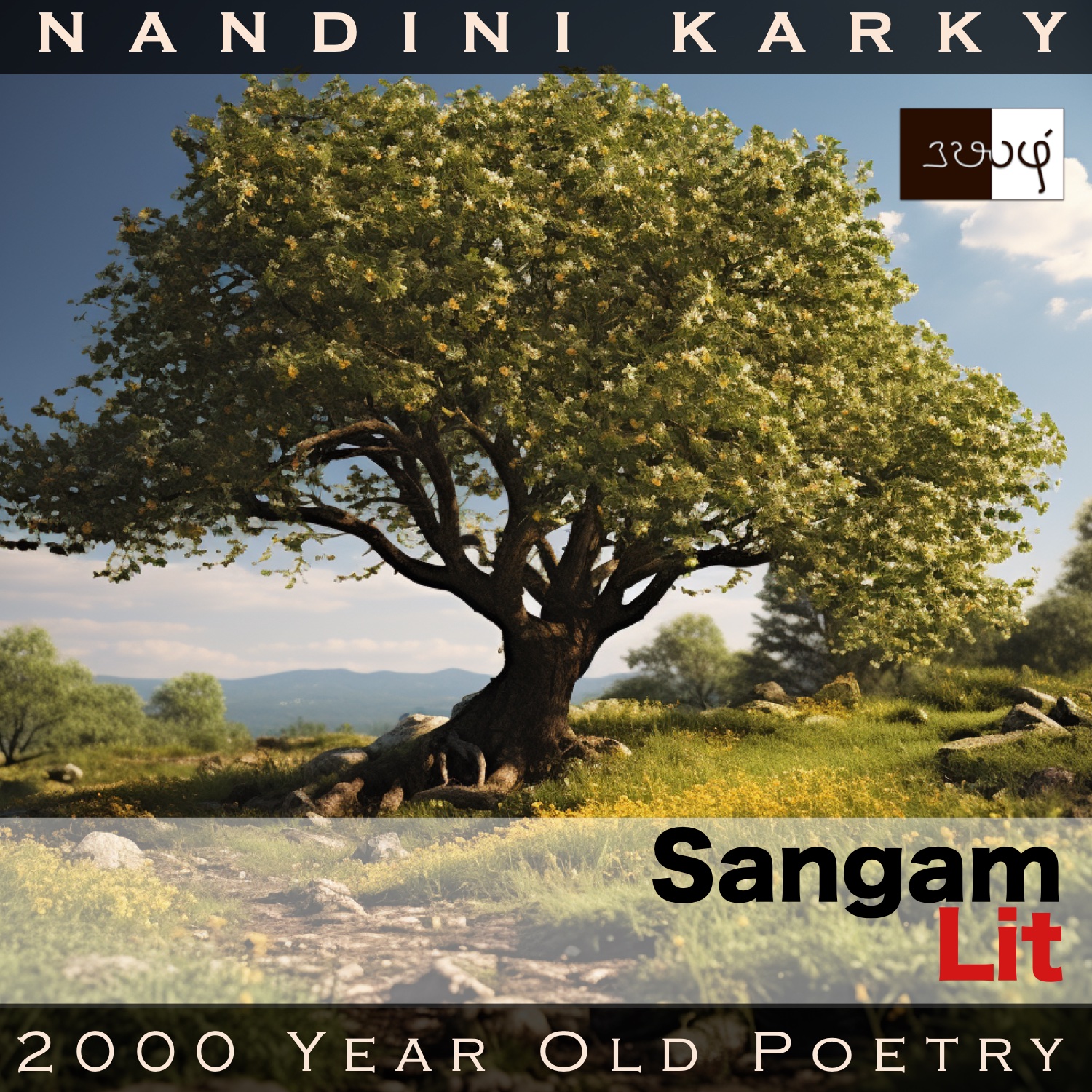Podcast: Play in new window | Download
Subscribe: Apple Podcasts | Spotify | Amazon Music | Android | iHeartRadio | TuneIn | RSS | More
In this episode, we listen to the great deeds of a king, as depicted in Sangam Literary work, Puranaanooru 224, penned about the Chozha King Karikaalan by the poet Karunkuzhal Aathanaar. The verse is situated in the category of ‘Pothuviyial Thinai’ or ‘Common Themes’ and talks about the consequences of this king’s demise.

அருப்பம் பேணாது அமர் கடந்ததூஉம்;
துணை புணர் ஆயமொடு தசும்பு உடன் தொலைச்சி,
இரு பாண் ஒக்கல் கடும்பு புரந்ததூஉம்;
அறம் அறக் கண்ட நெறி மாண் அவையத்து,
முறை நற்கு அறியுநர் முன்னுறப் புகழ்ந்த
தூ இயல் கொள்கைத் துகள் அறு மகளிரொடு,
பருதி உருவின் பல் படைப் புரிசை,
எருவை நுகர்ச்சி, யூப நெடுந் தூண்,
வேத வேள்வித் தொழில் முடித்ததூஉம்;
அறிந்தோன் மன்ற அறிவுடையாளன்:
இறந்தோன் தானே; அளித்து இவ் உலகம்!
அருவி மாறி, அஞ்சு வரக் கருகி,
பெரு வறங் கூர்ந்த வேனில் காலை,
பசித்த ஆயத்துப் பயன் நிரை தருமார்,
பூ வாள் கோவலர் பூவுடன் உதிரக்
கொய்து கட்டு அழித்த வேங்கையின்,
மெல் இயல் மகளிரும் இழை களைந்தனரே.
It appears as if we are in the midst of a series of songs that can be called the ‘obituaries of Sangam times’. In this verse, the poet brings out the achievements of this king through these words:
“Without considering the difficulty of attaining enemy forts, he won battles many; Along with friends for company, he lightened pots of liquor; He ended the suffering of huge families of bards; In the court of justice, where virtue flourishes, he stands along with his flawless women and as those who know the right ways of life sing about the pure principles, within his multi-level fort in the shape of the sun, above which vultures rove, near a tall sacrificial pillar, he performed religious rituals;
That one, who was knowledgeable and wise, is now dead. The world is to be pitied! When the cascades shrink and there’s a fearsome scorching of all things, in the dry and dreary season of summer, on a sharp morning in this time, to end the distress of their hungry cattle, cowherds use their staff and make flowers wither down. Akin to one such ‘Vengai’ tree, bereft of flowers, his gentle-natured maiden are now shorn of their jewels!”
Time to delve into the nuances. The poet talks about the courage and determination of the king in laying siege to enemy forts and winning them over. Then, as if saying the king is not all work and no play, the poet talks about how he is one to delight in the pleasures of life in those times such as partaking fine toddy with his friends. Next, to be mentioned is the king’s nature to render charity to bards and their kith and kin; This is followed by a compound description, wherein royal women, company of knowledgeable priests, king’s huge sun-shaped abode, tall sacrificial pillar there, as well as the performance of religious rituals by this king is celebrated.
Continuing by saying that such a great ruler was dead, the poet remarks how the world is now to be pitied. And then, the poet brings before our eyes, the state of an Indian Kino tree, during a scorching summer, when even the waterfalls have shrunk and there was a fearsome heat everywhere. At this time, cowherds, wanting to end the hunger of their cattle, would lift their long staffs and make flowers of the ‘Vengai’ tree drop down. Just like how the tree would stand, without its luminous yellow flowers, after the death of this king, his royal women too stood, bereft of their jewels, the poet concludes. In Aham poems, we have seen how these Sangam women do not wear jewels or even dress themselves up, when their men part away on a mission. So, it’s clear that this note about royal women, standing shorn of their ornaments after the death of their king, is an extension of that custom. While such gender-directed traditions have become outdated, through this verse, we also understand what was celebrated as the timeless, essential attributes of a great leader and these were valour in battle, generosity to artists, company of virtuous women, and adherence to the religious practices of those times, and abstracting these things, we end up with work, charity, family and community – Ancient values not so different from that of a person living in the twenty-first century!




Share your thoughts...